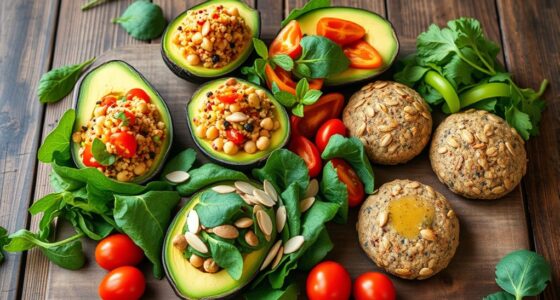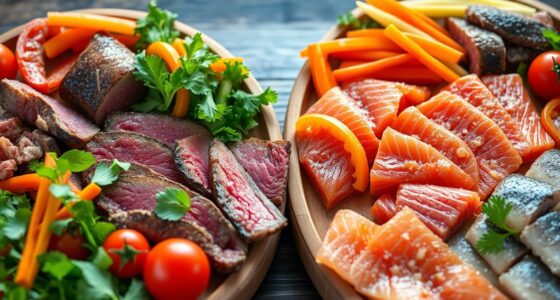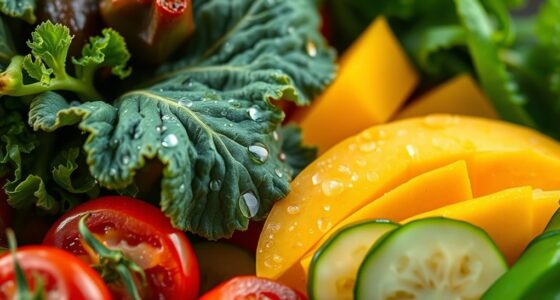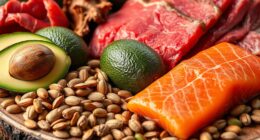Many believe you can’t be athletic or strong on a raw diet, but that’s not true. Raw foods like leafy greens, nuts, seeds, and sprouted grains provide essential nutrients, protein, and calories needed for muscle growth, energy, and recovery. They support rigorous training routines and athletic performance, often better than cooked or animal-based foods. With proper planning, a raw diet can meet all your nutritional needs. Keep exploring to discover how raw diets can power your strength and performance.
Key Takeaways
- Raw foods like nuts, seeds, and sprouted grains provide sufficient protein for muscle growth and recovery.
- Nutrient-rich raw vegetables and fruits support energy, strength, and overall athletic performance.
- Calorie-dense options such as avocados and dried fruits meet the energy needs of athletes.
- Raw diets preserve vital micronutrients like vitamins and minerals essential for muscle and tissue repair.
- Properly planned raw diets can fully support rigorous training and athletic goals without relying on cooked or animal foods.

Many people believe that a raw diet can’t support athletic performance or build strength, but this is a common misconception. The idea that you need cooked foods or animal products to maximize strength is rooted in plant-based myths that have persisted despite mounting evidence to the contrary. When you focus on strength nutrition, you realize that many raw plant foods provide the necessary nutrients for muscle growth, energy, and recovery. Leafy greens, nuts, seeds, sprouted grains, and fruits can all serve as powerful sources of protein, healthy fats, vitamins, and minerals that fuel athletic performance.
Raw foods can support strength and athletic performance, providing vital nutrients for muscle growth and recovery.
A common misconception is that raw diets lack sufficient protein, but this isn’t true. Many raw foods are rich in protein, such as hemp seeds, chia seeds, spirulina, and sprouted legumes. These foods can easily meet your daily protein needs when incorporated thoughtfully into your diet. For example, blending a smoothie with hemp seeds and berries provides a balanced mix of amino acids and antioxidants. You don’t need to cook or process these foods heavily to *unleash* their nutritional potential. Their raw state often preserves more nutrients, making them even more effective for supporting your strength goals. Additionally, the protective benefits of raw foods help maintain optimal body function and recovery, which are essential for athletes.
Another plant-based myth suggests that raw diets are too low in calories to sustain intense physical activity. However, calorie-dense raw foods like avocados, nuts, and dried fruits can supply ample energy for demanding workouts. Combining these with fresh vegetables and fruits creates a nutrient-dense, satisfying diet that can match or surpass the energy provided by cooked or animal-based options. Many athletes thrive on raw diets because they notice quicker recovery times, better digestion, and sustained energy levels—proof that raw foods can support even the most rigorous training routines.
Furthermore, some believe raw diets lack the necessary micronutrients for *ideal* performance, but this isn’t accurate. Raw foods are packed with vitamins, minerals, and antioxidants that combat inflammation and promote recovery. For instance, bell peppers and citrus fruits are high in vitamin C, aiding in collagen synthesis and tissue repair. Leafy greens supply iron and calcium, *vital* for muscle function and bone health. When you prioritize a variety of colorful vegetables, fruits, nuts, and seeds, you’re giving your body everything it needs to build strength and sustain high-level athletic performance.
Frequently Asked Questions
Can Raw Diets Provide Enough Protein for Athletes?
You can definitely get enough raw protein for your athletic needs by focusing on plant-based nutrients. Raw diets rich in nuts, seeds, sprouted grains, and legumes provide ample protein to support strength and endurance. By choosing a variety of these raw plant-based nutrients, you guarantee your body gets essential amino acids. Proper planning helps you meet or even exceed your protein requirements, proving that raw diets can fuel an active, athletic lifestyle.
How Do Raw Diets Support Muscle Recovery After Workouts?
After workouts, a raw diet supports muscle recovery through high fiber intake and proper hydration strategies. You get essential nutrients from raw fruits, vegetables, and nuts that help repair tissues and reduce inflammation. Staying well-hydrated aids nutrient absorption and flushes out toxins. By focusing on these elements, you can optimize recovery, maintain energy levels, and continue building strength without sacrificing the benefits of a raw diet.
Are Raw Diets Suitable for High-Endurance Sports?
Think of a raw diet as a finely tuned engine—you need the right fuel for high-endurance sports. While raw diet myths suggest it’s unsuitable, you can achieve athletic versatility with proper planning. Raw diets can supply essential nutrients for stamina and recovery, but you may need to supplement or diversify foods for sustained energy. With discipline and knowledge, you can push your limits and excel in endurance activities on a raw diet.
What Are the Common Nutritional Deficiencies in Raw Diets?
When you follow a raw diet, you might face common nutritional deficiencies like vitamin deficiencies and mineral gaps. You could miss out on essential nutrients found in cooked foods, such as vitamin B12, iron, and zinc. To avoid these issues, you need to plan carefully, including a variety of raw fruits, vegetables, nuts, and seeds, or consider supplements to fill in nutritional gaps and maintain your energy and strength.
How Does Raw Eating Impact Athletic Performance Long-Term?
Your athletic strength can thrive on a raw diet, defying raw food myths that suggest otherwise. Long-term, eating raw may boost energy, improve recovery, and enhance performance, provided you balance your nutrients properly. You might surprise yourself with sustained stamina and muscle gains, proving that raw eating can support top-tier athletic feats. Stay mindful of potential deficiencies, but rest assured, raw food can fuel your athletic journey remarkably well.
Conclusion
Don’t believe the myth that you can’t be athletic or strong on a raw diet. You can fuel your body, build muscle, and perform at your best—all while sticking to raw foods. You can challenge your limits, you can grow stronger, and you can achieve your goals. Remember, it’s not about the diet alone, but about dedication, balance, and belief. Embrace the raw, push your boundaries, and prove that strength and athletics go hand in hand.










